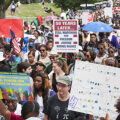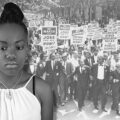
By Rahim Islam
Message to the community, specifically the leaders:
While this message is for everyone, it is tailored specifically to the Black leaders. I define Black leaders as more than just elected officials. This designation includes those individuals who hold a position that serves the needs of the Black community (i.e. appointed, business, non-profit, civic, public sector, religious, etc.). Why?
Because within the Black community, leadership has the capacity, the resources, the expertise, and the ability to develop and orchestrate a plan of action to save our community. The questions for us are, “Who are these people?” and “Why is our community not moving in the right direction?”
I contend that the Black community is a “body” without a “head”. Who represents the Black community? Some may respond that the Black community is not a monolithic group, and is represented by hundreds of people. However, having hundreds of leaders without centralized and strategic representation is like having no leadership at all.
Everyone is a leader in some capacity, but some people and their actions have a greater impact on others, and because of their position (i.e. job, title, organization mission, etc.), they have the responsibility to provide leadership to the community. The community expects that this group will do the right thing for and by them.
Unfortunately, this group and many of the sectors that they represent are unorganized, due to individualism and organizational tribalism. Therefore, nothing is moving in any significant way for our community. These leaders possess a myriad of resources to ameliorate major sectors of the Black community. What remains lacking is a vision, the will, and the heart. Certainly, there are some who are motivated by helping the community to get onto its feet and succeed.
However, there are still too many Black leaders who are clueless about their history, the shoulders that they stand on, and the legacy that they represent. Were it not for our ancestors, many individuals in Black leadership wouldn’t even be in their positions. These posts were hard-fought for with the hope that future leaders would continue the struggle. Too many Black leaders have embraced the approach of their White predecessors in many instances, especially in government and politics.
Today in Philadelphia, although African-Americans hold many key political positions, the majority of Blacks in Philadelphia are living at or near poverty. The school to prison pipeline is primed. The education system remains a failure. Nearly every Black neighborhood is in decline, and every major social-economic indicator shows that the Black community in near serious demise.
A new term has been coined as a result of this phenomenon called “Black Fatigue.” Many Black people don’t understand why their plight hasn’t improved when Blacks are largely controlling the city.
Natural tensions exist between one branch of government and others are designed to create checks and balances in government. Locally, these tensions occur between City Council and the Mayor’s office, city government and state government, independent boards and commissions and city governments, and so forth.
Depending on who is leading these different entities, these inherent tensions subside, and progress is made. Otherwise, they become exacerbated, and nothing gets accomplished. This is also played out on a national level when tensions between the Executive Branch of government (President) and the Legislative Branch (Congress) result in a stalemate.
Having an African-American in a position of political leadership isn’t enough if they do not understand their purpose and if they do not believe that they are part of the Black struggle.
Black leadership that is rendered impotent defies the hope of our ancestors that these individuals would continue to unite and defend the Black community. If Black leaders do not understand their responsibility to us in the execution of their duties, they will allow “majority” politics to rule, in which case they’ve done nothing more than assimilate.
These individuals are now the caretakers and shepherds of these institutions that have oppressed Black people, yet they often defend bad practices more diligently than their White predecessors. This is the embodiment and expression of mental and psychological slavery. How is it that Blacks control nearly every key government position in Philadelphia, and yet we continue the tradition that serves White people and their special interest groups at the expense of the Black community who helped vote them into power?
The Black community is in dire straits and demands that governmental agencies function at the highest level to deliver to those who are the least represented and underserved. Government by its nature operates in a silo, and it takes good leaders to get the government to work. Even when these agencies are not productive, someone benefits, and we know that based on empirical evidence that the Black community does not benefit.
Summarily, the White community can afford structural divisions, because their community is not in the disarray that ours is in. When things are going well, I’ve heard many people say “We will wait them out,” meaning that we will keep the obstruction in place until we can get to the next election cycle and replace the leadership. This sometimes equates to three or more years of delays of inaction, which disadvantages the Black community further.
While I describe the dysfunction amongst our Black leaders in government, in all other sectors, the plight is similar – absolute disunity of leadership. Throughout our brief history as a free people, we’ve had some great individual leaders. Most– if not all– were giving us sound guidance, especially when it came to responding to what Whites were doing to us.
However, not much instruction was aimed at what we, as Black people, we’re not doing which was to unite under the “Black” flag. With the exception of Marcus Garvey, we have never had an authentic Black movement. Some may espouse that the Nation of Islam was a Black Nationalist movement, but the reality is that it was also a religious movement, and that was a big difference.
What the Black community needs more now than anything is unity. Not the unity that is some superficial description of Black people all doing the same thing at the same time – that’s unrealistic. The unity that I’m referencing is a functional unity. Black people need functional unity to defend ourselves against the mindset and erroneous public opinion that Blacks are where we are because of our inferiority. Many cite the token leadership that we currently hold as examples. There is a misguided mindset and erroneous public opinion that Blacks have had an equal chance to succeed in America, yet have refused to take advantage of these opportunities.
Interestingly, the proponents of this viewpoint also dismiss our history in America, and postulate that this history of oppression and discrimination has no bearing on our current dilemma today. This perspective is delusional and hypocritical. America is a capitalistic society in which Blacks by design were (and continue to be) denied capital. This simple factor is crippling to everything aspect of Black life in America.
Today, Black people have more disparities than any group in America. Blacks continue to lose ground in nearly every positive demographic, and dominate nearly every negative demographic. None is more impactful than the massive wealth gap that exists between White and Black people–which is a direct result of the enslavement–and legal racial discrimination against Black people.
America’s economy, considered one of the largest in the world, represents nearly $150 trillion annually. Blacks have little or no real ownership. Black ownership of the nation’s wealth remains where it was in 1860 near the end of slavery (pre-emancipation) at one half of one percent.
Where you start matters, especially when it comes to wealth. While America was oppressing Black people through enslavement and legal discrimination, America was becoming today’s $150 trillion economy, which is still completely owned by White America. There is a direct link to the overwhelming economic benefit enjoyed today by White people, businesses, and institutions.
This competitive advantage is lethal and plays out in every sector of American life. This is also why very few Black for-profit companies are adequately capitalized and hardly any of our “non-profit” institutions are endowed. America must acknowledge and remedy the economic advantage that Whites have over Blacks.
Because of a nearly 450-year head start with the enslavement of tens of millions of Black people with no compensation, the American institution of slavery produced unbelievable economic gains and wealth for the White community that exists to this day. To deny this advantage is absurd, ludicrous and pathological. While the institution of slavery doesn’t exist today, its infrastructure (ideas, beliefs, values, and policies) still influence other American institutions.
Brothers and sisters, we must remember that it’s all about competition. While we are severely disadvantaged, no one really cares about our plight. America is about winners and losers. You are able to win because you understand freedom and the responsibility that comes with being free, and you lose because you’re haven’t truly grasped the meaning of freedom.
Today we hear from many “right-wing” conservatives (self-appointed keepers of the so-called “American way of life) telling the Black community to stop playing the “race card,” stating “the past is the past — I didn’t enslave anyone.” They also say, “My people endure hardships too, so if Black people can’t compete under the concept of free competition, something is wrong with them, not the system,” and “America is about free enterprise.” With little to no knowledge about our history, our children grow up believing in this myth and actualize a core of hopelessness.
We have allowed our history to be marginalized and removed from the public discourse. This permission to dismiss our history of oppression and discrimination makes us unable to challenge racism and discrimination. They have become structural and institutional because we have accepted real bias: bias in the government, in corporate America, in quasi-government boards and commissions, in education at all levels, and in science and medicine.
Because of the failure on the part of Black leaders to defend Black people, racism is invisible, yet more lethal than when Whites who wore hoods and vowed never to allow Blacks to become full citizens. Blacks are unable to hold Whites accountable because they’re unable to hold themselves accountable. If America isn’t getting a heavy dose of accountability from Black people, the antiquated notion that Blacks are inherently lazy and deserve the outcomes that we have will be cemented. This will relegate the future Black generations to becoming a permanent underclass in America. Black people must take responsibility. While we had marginal success, that success would look much different today if we had more Black leaders fighting on behalf of Black people instead of replacing White oppressors with African American oppressors who believe the same ideology that Blacks are inferior and Whites are superior.
While we all know that racism exists, when was the last piece of anti-racism legislation adopted in America? Just the opposite has occurred. Both racism and discrimination are buried within institutional thinking. Its manifestation can be seen in the racial makeup of the ownership and governance (structural bias).
This structural bias is becoming more entrenched, and can’t be corrected until more Black leaders see that we are all in this together. Our individual successes will always be threatened by our inability to achieve group success. Nothing should divide Black people, not the aspect of leadership we represent nor the viewpoint from which we come. The current reality is unacceptable and unjustifiable. We’re in a crisis and at a crossroads that requires our immediate and unapologetic response.
I regret to conclude that given the downward spiral of every demographic, our Black leaders seem unwilling or unable to mount a collective offense or defense. When nothing is being done, we not only fail our ancestors, we also support the misrepresentation of Black inferiority. While I fundamentally believe that we should never exonerate America for the damage it has done to our people, we are responsible for our own destiny and self-determination. No one is going to save Black people but Black people.
Today, our leaders suffer from an acute level of hopelessness and group paralysis. We have Black leaders that are afraid to make hard or smart decisions that could positively impact the Black community. This paralysis emanates from systemic psychological slavery where these leaders refuse to threaten or anger their base or special interest groups. Sadly, these leaders adopt “easy” and somewhat uninformed decisions that either prolongs the problem or that don’t empower the Black community. At the same time, we have our most economically mobile not championing Black independence, and in many cases these individuals support and advance disparaging ideas and racist stereotypes about Black people.
Despite the complexity and despair of these issues that contribute to our sense of despondence, hope resides in our ability to unite our leadership -functional unity. It is this functional unity that is necessary to change the trajectory of our people. Much of our hopelessness and disunity is inherited, and we must do all we can to break the cycle.
The late Rev. Dr. Martin Luther King said that our power lies in our unity, and that our leaders must lead by example. Those that consider themselves leaders must come together and create a table where we can begin to discuss these issues. They have an obligation to make our case as representatives of an oppressed group while holding office in Pharaoh’s government. We have no excuses. Our inability to unite places the Black community in a very vulnerable position, in what I describe as a “perfect storm.”
This perfect storm will take place when a number of horrendous things begin to happen within our community and culminate over the next 15 to 25 years. In addition to the rolling back of all the gains achieved by Black people in the 60s, there is a reluctance to restore and fight for new gains. There is also a lack of America’s accountability regarding the social-economic conditions that Black people face today – the general opinion is that White privilege does not exist, and America has a contrived race issue.
Many ill-informed pundits argue that we now live in a post-racial society, while massive wealth disparities still exist between Blacks and Whites as Whites maintain a near absolute control over the American economy and its institutions.
Additionally, the Black school to prison pipeline, which represents the world’s most egregious human rights violation of our time, has literally decimated the Black family and community and has significantly crippled our ability to mount any real defense. When we examine the continuum of every statistical social-economic area, we will find that the negative numbers that impact the Black community today will only worsen over the next 15 to 25 years.
The pump is primed. We won’t improve ourselves without serious interruption. Finally, the Black community is losing a population of elders born before 1935 that represent the final group of Black pioneers that were actually young adults or adults during the last campaign of “open” racism in America – this group has a personal experience of the sting of overt American racism. They have lived it. They carry the institutional knowledge and memories that are the foundation for all aspects of the ongoing fight for freedom, justice, and equality for Black people in America. Our entire present day generation stands on the legacy of their struggles.
However, in many ways, these elders were duped and hoodwinked into believing that under certain circumstances, America would treat Blacks as full citizens. The current facts repute this assertion. But this group truly understands the adversaries of Black people, and how these opponents created a climate designed to undermine and destroy Black unity, while supporting Black individualism and contributing to Black tribalism. We must break this cycle of disunity and defend our people.
In part two of this article, I will elaborate more on what we need to do in order to effectively break the cycle of Black disunity.
Rahim Islam is a National Speaker and Writer, Convener of Philadelphia Community of Leaders, and President/CEO of Universal Companies, a community development and education management company headquartered in Philadelphia, PA. Follow Rahim Islam on FaceBook(Rahim Islam) & Twitter (@RahimIslamUC)

















Leave a Comment